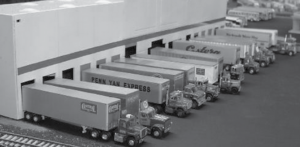A 2021 report says Thurston County has double the amount of industrial-zoned land needed for the next 20 years
Across the US, a new economy is emerging. It transcends local markets, even stretching beyond national boundaries. You can order goods from far-off countries without leaving the office or your home. Container ships and cargo planes form a leg of the “supply chain,” but as the products get closer to their destination, trucks and trains deliver goods to logistics centers where they disgorge their loads into warehouses. Maybe you’ve seen these semi-trucks in rural landscapes, lined up by the dozens as machines in turn fill other trucks with cardboard boxes that will eventually arrive on your doorstep.

The new economy shows up in proposals to expand airports, or build new ones, as cargo planes crowd out passenger flights. It has also created a seemingly insatiable demand for more and more rural and agricultural land to be rezoned for industry and warehousing. This race for space looms over the whole country and Thurston County is no exception.
What does this mean for Thurston County?
According to its 2021 Buildable Lands Report, Thurston County already has plenty of industrially zoned land. There are many thousands of square feet of warehouse space located in parts of Lacey and Tumwater; in Olympia around Munn Lake and Mottman Industrial Park, in Yelm and south to Grand Mound. Based on the findings in the report, this is more than double the amount needed over the next 20 years —all within the Urban Growth Boundaries of the County’s cities.
Given this projection of ample industrially zoned land, what happens when investors submit applications to build more and bigger warehouses and “logistics centers” on land not zoned for those uses? These would convert much of rural Thurston County from agricultural land to industrial land if County Commissioners agreed to change zoning to accommodate the applicants.
Recently, proposals by corporations such as Panattoni, NorthPoint, and UpCastle have encountered resistance from nearby communities and created a dilemma for County Commissioners – accede to demands for rezone, or heed community concerns about impacts on climate, the environment, infrastructure and the future of agriculture.
Commissioners have responded by contracting for a new study to assess whether an adequate supply of industrial land exists in “urban growth areas” and rural Thurston County – apparently outside the Urban Growth Boundary.
The market takes precedence
The provisions of the RFP make it likely that the study will find a need to rezone additional land to support industrial and warehouse uses (see sidebar). Any requirement to investigate and consider community integrity and social needs is missing. For example, the RFP instructs the consultant to “include the criteria industrial developers look for when considering a project/site.” There is no reference to criteria residents or local communities look for when evaluating developments.
The Commissioners will not be using the findings about how much industrially zoned land is available to inform deliberations about how to proceed – where or even whether to consider rezones; what kind of regulations to alter and to what end; etc. Instead, they have given the consultant the task of identifying specific areas to be rezoned, along with providing changes that should be made to regulations; and proposing infrastructure investments. In short to define the policy.
Depending on the specifics provided by the consultant, there could be a massive transformation of community life in Thurston County. Those specifics will have come as a result of the consultant’s deliberations based on “professional judgment” and “expertise.” There will be no opportunity for actual deliberation by the Commissioners, members of the County Planning Commission or the public whose lives will be altered.
Tellingly, the consultant is required to provide a technical expert to appear with the findings for up to two public meetings with Commissioners. The Commissioners will not be able to explain the report to the public. The public will not be able to have confidence that anything they say will make a difference.
Mary Jo Dolis is an interested observer of local government. She lives in Olympia.
Public policy-making without the public“The assessment should consider existing industrial lands and uses, regulatory constraints, environmental constraints, infrastructure constraints and economic trends for future industrial demand. … The study will address three growth scenarios over the next 20 years. Each scenario will be accompanied by recommended changes to policies and regulatory requirements.” [from the Thurston County RFP for Assessment of Industrial Lands] |
Be First to Comment